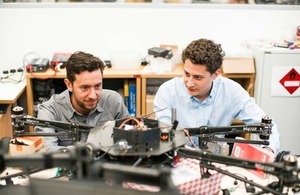
Funding is part of the robots for a safer world challenge.
Environments like nuclear, offshore, space and deep mining can be challenging for people to work in, with potentially extreme temperatures, pressure and high levels of radiation.
Up to £2 million is available to fund feasibility studies and collaborative R&D projects that develop electronics, sensors and photonics that can cope with these conditions.
Robots for a safer world
This competition is part of the Industrial Strategy Challenge Fund to develop safer and more productive technologies for working in extreme environments. Funding is provided by UK Research and Innovation and delivered by Innovate UK.
Through the robots for a safer world challenge, government is investing £93 million in advanced robotics that remove people from potentially harmful operations, improve productivity, and open up new, cross-disciplinary opportunities.
As well as this competition, the programme is funding robotics research hubs and innovation projects that will support improved delivery of public services.
One funded project is using robots to fix underground pipes and reduce roadworks.
More robust systems for robotics
The aim of this competition is to improve how robots operate in extreme environments by developing robust devices and components, including:
- sensing and actuation
- on-board electronics
- radio frequency electronics
- power supplies
- control systems
- task-oriented payloads
Competition themes
The competition is for feasibility studies and collaborative research and development.
Projects could look at the following.
Optics and photonics-based sensing
This includes the use of light detection and ranging technologies for high-resolution 3D mapping of terrain in areas like space to help with navigation and awareness.
Compound semiconductor-based electronics
This includes design and development of components and integrated circuits that support robotics and AI systems, such as advanced sensing, communication or actuation. Reducing the size and weight of power-supplies also falls under this theme.
Packaging
This includes the design of electronics, photonics and sensors components, circuits and devices to make them more resilient.
Modelling and simulation
This could include projects that investigate electromagnetic effects or modelling radiation shielding for use on robotics and AI systems.
Competition information
- this competition opens on 11 March 2019, and the deadline for applications is midday on 8 May 2019
- for feasibility studies, a UK business SME must lead the project, working with other businesses, research, public sector or third sector organisations. Total project costs can be between £25,000 and £100,000, and projects can last up to 12 months
- for collaborative research and development, a UK business of any size can lead a project, working with at least one SME and other businesses, research, public sector or third sector organisations. Total project costs can be between £50,000 and £250,000 and projects can last up to 18 months
- businesses could get up to 70% of their project costs
- projects must end no later than 31 March 2021






